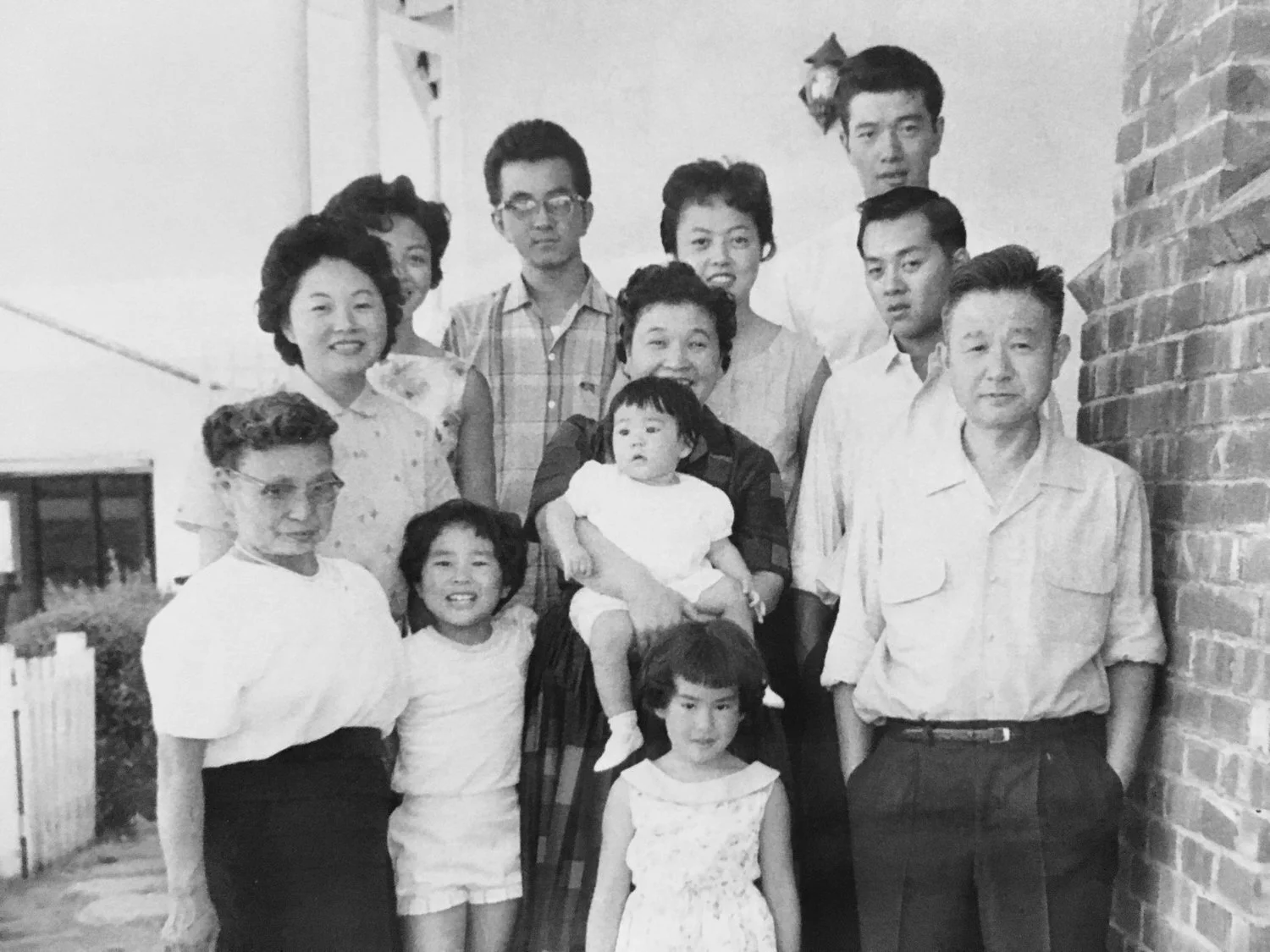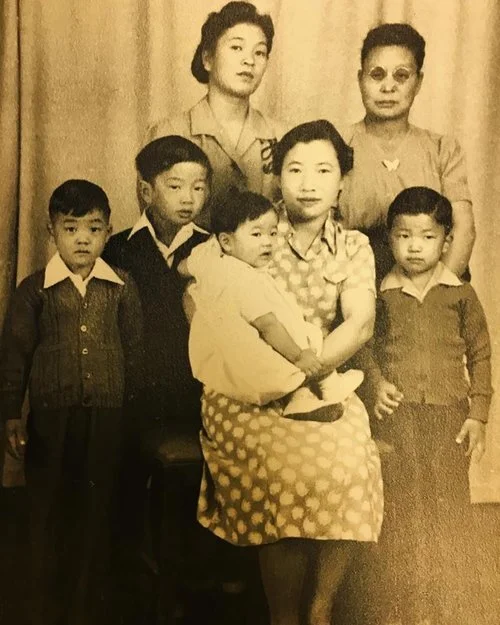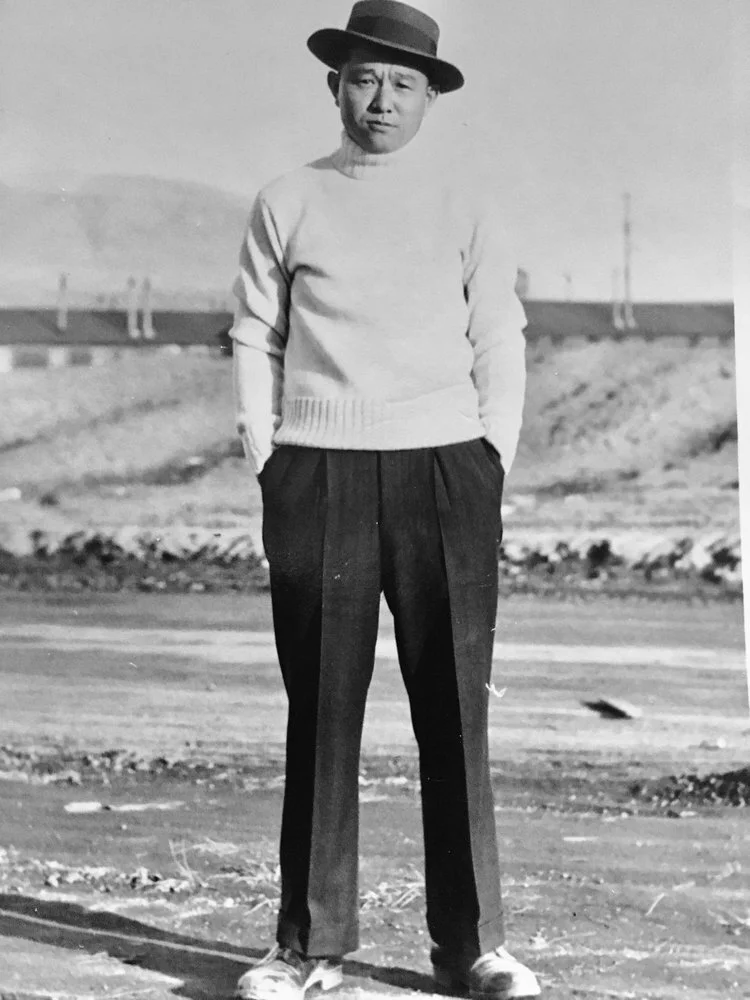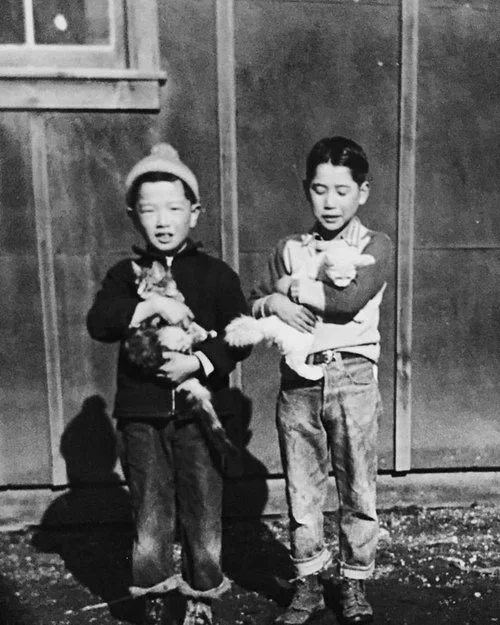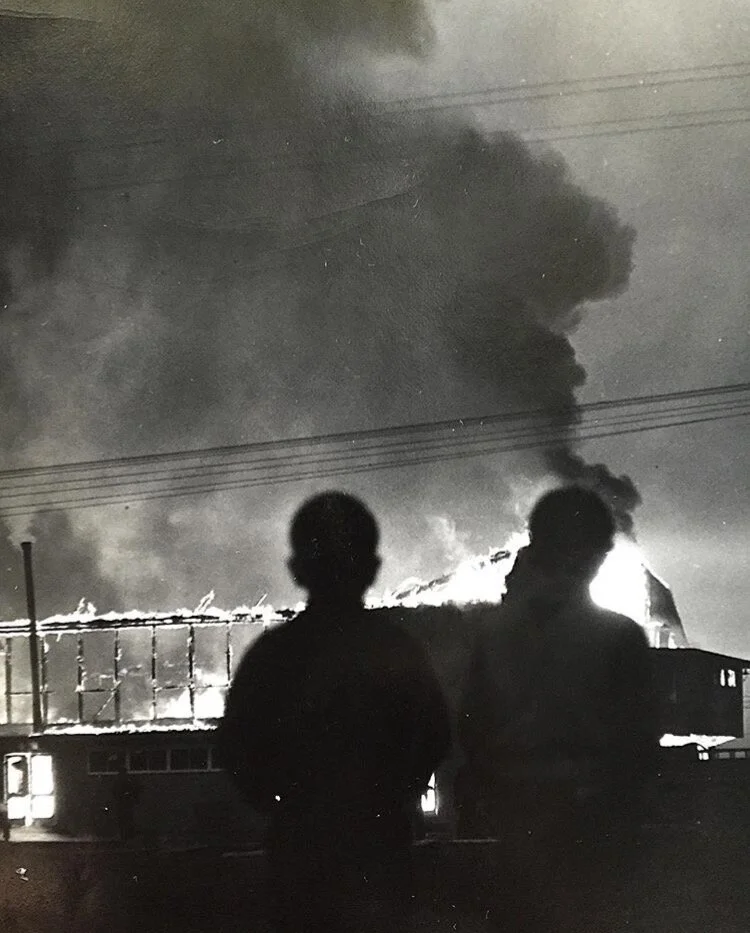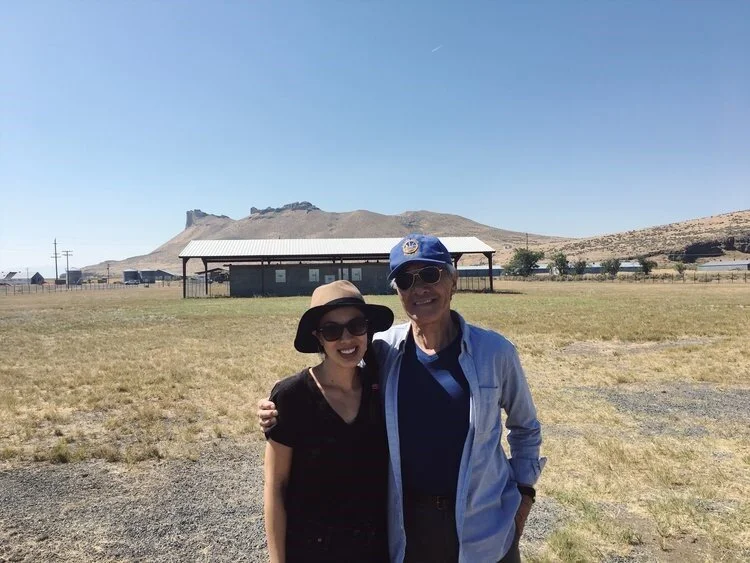Mitsuki Mikki Tsuchida
““Why are we standing over here with name tags? They weren’t abusing us but it was still cruel, of course. Herding us into the middle of nowhere.””
When I first started asking my dad about his camp memories over fifteen years ago, he would tell me about the horrid stench of the Santa Anita horse stables, taking showers underneath the enormous nozzles made for horses, and watching people’s toothpaste run down the troughs in the latrines. He recalled that for four years, everything they owned in the barracks was covered in a layer of dust and sand, and that just going to the bathroom was an ordeal that required planning.
Later, his stories changed to how watching his father become “unruly,” made him bitter. He began to reveal the deep mental wounds the experience cast upon him: How he and other students would be hit by the Japanese teachers in Tule Lake and how his lack of English skills after camp became a shameful source of embarrassment.
My dad’s memories are also the only link to understanding what my grandparents may have gone through, as my grandfather Tom passed away when I was eight, and my grandmother Itsuye and I could barely communicate. Perhaps even if I could speak Japanese, she was the kind of woman that light-heartedly laughed at my questions, brushing them away. My grandfather’s anger at their imprisonment compelled him to be vocal–often confrontational–and he was targeted by the FBI several times over the course of the war. He nearly made the decision to go back to Japan with my dad and grandmother, but after discovering that Japan was actually losing the war (contrary to what he believed), they stayed. He voiced his disappointment with the treatment for the rest of his life and was writing a memoir until he suffered a stroke. But his writings are lost, and this is where I feel indebted to pick up the pieces.
For my dad’s willingness to be so open and forthcoming about his memories, I’ll be forever grateful.
Can you describe how grandma and grandpa met?
In Loomis where Grandpa was born, they were trying to arrange for him to get married and to work on a fruit farm. He didn't want to farm, so he fled to San Francisco. He was attending adult night school where he met my mom. She was only 17 years old and he was ten years older and seven or eight months after they met, they got married in May 1934. That age gap was very prominent in the Japanese community.
Do you think there was love in their marriage?
There was never any holding hands or talking. I'd see my mom cry occasionally, before the war. My mom wasn't that literate or educated but I didn't see any kind of sweet tenderness. I didn't want my relationship with a woman that way when I grew up. I used to get examples of how men treat ladies by watching movies.
Was it just a convenience for them to be married?
I guess my dad proposed to my mom and instead of being all alone, with only her sister in San Francisco, she said yes. But my mom's sister objected to him. She did not like him, so there was a friction there.
Do you remember a typical day before the war in San Francisco?
They were both working cleaning people’s homes. But they were taking turns and had to find someone to sit for me so there was an elderly Japanese man half a block down, who had a shoe repair shop and so he had this rotating handle where you would cut with a blade the leather. So there were lots of chunks of leather leftover and I would play with that.
The last place on Baker Street I kind of remember, and I almost got hit by a car. Across the street the whole block was demolished for some reason. All the homes were gone, but there was an open area. My dad I think got a kite and so with some neighborhood kids we were flying it above that lot. And I was all excited and I remember I went inside to retrieve something and then when I came out, I wasn’t paying attention to the cars crossing but a car came from my right. I didn’t look but the guy honked his horn and stopped. But I came that close to being hit and then my dad had a fit.
They were also trying to enroll me into a Catholic school and there were nuns, and it scared the heck out of me. And you know they’re smiling and all that and my mom is doing the best she can to enroll me, I remember. And I wouldn’t go into the school grounds because I was afraid. She was going to leave me but I was yelling. I started to run halfway down the street, I just had this terrible fear of these Catholic nuns because of the way they dressed. So as it turned out maybe it was a good thing. I never asked why they tried enroll me. I was attending kindergarten and that was the extent of my English learning, then the war broke out. I do recall playing [Japanese] ‘78 records all the time so that’s where I have memories of these Japanese songs before the war. There were military songs, so I could hum those easily.
Do you remember the day Pearl Harbor happened?
I got some hint that there was a war in progress and that it involved Japan. That's where I became aware of my Japanese heritage. I know they were talking and I would hear conversations with my dad’s acquaintances and from their body language, it was serious what was in store for them. And obviously years later I remembered it had to be that anti-Japanese feeling.
I remember waiting in line, and then I knew something was going on. It was ominous. Years later, I didn’t know the reason for my exile but it sobered me up quickly the day we arrived at Tanforan. The distinct military people on one side and the other people registration. We had these tags dangling, it looked like it was for postal delivery. Even a kid could ascertain, ‘What were we doing in this line?’ Everything was painstakingly slow.
I think I told you when I went to go take a Chinese girl out on a date in high school, her mother wouldn't let her go out. I go to the house and the girl says, 'You're Japanese.' And I just say, 'Yeah, I am. And you're Chinese.' And she says, 'I'm sorry, my mom won't let me go out with you.' Even that, it goes back to the time when Japan was invading China.
Was there anything else that made you aware something bad was happening?
One day all the Boys’ Day dolls were out. I came home after we were set to go to camp and the house was already bare. And there was this nice white lady talking to my mother and she was about to give all of my dolls away. And was screaming like mad. My mom and her laughed, and she said, ‘Well I guess that’s okay.’ I just had a fit, I put my arms out and said, 'No!' Then it was wrapped in paper, and we left some of our few belongings in a garage somewhere. I don't know who, but it was someone in San Francisco. Obviously it couldn't have been a Japanese family.
There was also a curfew in effect, I don't think you could be out in the streets at some ridiculous time, like 6:30 at night. There was a map of shaded areas that were restricted to the Japanese. He was in the wrong area. But how could you tell? You live there and I could see my dad being ignorant of that fact. I know that because he re-told that story, never to me. And then my mom used to say that we weren't rich but he was spending money on cameras, and it was taken away.
What about the day you left for the assembly center?
All I remember was waiting at the train station on one side of a line and that these guys were holding guns. They weren't pointing them at us, but what were we going to do? They didn't even have to carry it. Why are we standing over here with name tags? They weren't abusing us but it was still cruel, of course. Herding us into the middle of nowhere.
What are your most vivid memories at Santa Anita?
There were all these insects flying around. There was a horse fly. They were huge, like the size of a dragonfly. The first purchase my parents got at Santa Anita was a mosquito net to cover my bed. The showers were hard to get used to. We used those individual stalls for washing down the horses. So the nozzle was really wide, maybe a foot across and you had to pull this chain. My mother would lather me up and pull the chain and the water would come down. It was like being drenched by a bucket, so that kind of frightened me as a little kid.
And this is funny, well not funny. But army trucks would pull up and someone would shout, 'How many in your family?' And they would just throw the toilet paper at you and you had to go pick it up. That lack of human dignity, it just went on and on.
I didn't comprehend what crime we were being accused of. But then I realized we must've done something, like why am I here? So that part of going into the barracks, it's funny but after the stables in Santa Anita, it was like checking into the Fairmont Hotel at Topaz. As primitive as it was. When we first moved in, there were pinewood boards on the floor but they had a separation. You could see the ground. Inside every room was a potbelly stove but there were cracks between the boards. So when the dust storms came, it would just come up into the room. We were given linoleum to cover the floors but it didn't really help. There was a lot of white chalk there, and I heard it was alkaline or something. Something that's unhealthy. So when the wind blew strongly, it would just whirl around the whole camp. And if we were stranded somewhere and blocks away from our home, we would have to hide and wait for the dust storm to subside.
Since you were alone with grandma, what do you remember about moving from Topaz to Tule Lake?
It was just solemn and grim. No one was happy, we had to keep the shades closed all the time. The train would stop and stall constantly so we would peek constantly under the shades. But I remember seeing telephone poles that were tilting to one side. At Tule Lake all the kids were running around unsupervised. But she did start working at the mess hall.
How about Tule Lake?
Even when it was dinner time and we were waiting, there would be searchlights going around. Just like a concentration camp, these floodlights would be going all around the camp or sometimes they would lock in on a window. So there wasn't privacy. Sometimes late at night I would go to the toilet and you had to walk in the middle part of the block. And sometimes a searchlight would come on from the perimeter and just follow you. So just like a prisoner, they were watching you with these floodlights.
And the people who were the dependents of the guards lived on the other side of the camp, we would see Caucasian kids playing. The biggest treat in those four years was that went with my mom to see their living quarters. Our friend Suzy Sakamoto was cleaning their houses and she gave us some See's candy. There were couches, it was nice.
What were Grandma and Grandpa doing?
Grandma worked in the mess hall. But that was the problem. Since the administration were hakujins, you had to speak English in order to get a job. So that was the reason all these Kibei [second generation Americans educated in Japan] didn't have anything to do. They sat around. After a while, you're bound to get radical, and if you have all of your education in Japan, it's ingrained. In the beginning, Japan was pretty aggressive. For a while it looked like they would be a threat to the U.S.
But Grandpa was extremely angry. He thought the treatment was terribly unfair. And so he'd talk about it in Japanese, the court procedure of the U.S. law. It wasn't even practiced at all. They used the word "relocate." But Tule Lake was a very violent place. Fighting, ganging up on people.
Do you think that the lack of parenting and upheaval affected everyone or just your parents?
Everyone, definitely. If anything my dad was on my butt quite a bit compared to the other fathers. Maybe because I was the only son. All of my friends had a lot of brothers and sisters. But the children were the victims of this. And that was because fathers of a family behaved like they weren't the head of a family. Not having that regimented work schedule; they weren't doing anything. Sure they're being fed three times a day, not doing anything. So they had forgotten they were the father figure. They would just sit and dine with their friends and didn't really care about their children and look to see they were eating properly.
What do you remember seeing?
I was impressionable, and I was observing adults with nothing to do, it must've been all that kind of hopelessness. The men were just doing what they felt. So the propensity of gambling among Japanese was prevalent and they had a casino-like atmosphere. And if you enjoyed drinking, well, they needed something to stimulate them, I guess. So they made this sake but it would make them very sick and they would throw up. You could hear them coming home in the middle of the night.
But there was only a problem between people who were divided along the two ideologies, right?
Yeah. And you knew where they were from if you got into an argument, pro or con Japanese. There's nowhere else to go, everyone lives in the same type of barrack, so you're marked. There's no security and so people were bursting in and people were beating up the guy or the husband. I heard that going around. And my dad, I think, was involved and that was the reason he was taken away from Topaz. I saw him get handcuffed and taken away as I was coming home from school. He looked at me but didn't even acknowledge. And my mom was just hysterical, just crying like mad. It was just my mom and I who went to Tule Lake in Block 49 and he went to Leupp.
One day he came home and was released. He got into the same mode, teaching Japanese in high school. But there was an argument in the next block, with a crowd forming of people yelling at each other. I remember my dad going out there, too. He was relatively tall back then compared to other Japanese so he stood out.
So, was he going around beating people up?
That part I can't confirm. But I know he was considered dangerous according to an FBI report. But he never joined that Hoshidan group.
He had a 2x4 and the length was over six feet but he tapered it to make it narrower like a handle, like a baseball bat. And on the other end he had two spikes, nails in there. So if he was being targeted to be beaten up, he was taking that with him to the bathroom. He was carrying it in the middle of the night. If he was deemed a dog, or enemy or a spy, he might have been in fear for his life. And with his kendo experience he might have been formidable if he had to use it.
So then from Tule Lake, maybe a year went by after he came home, and here again I came around the corner and he was taken away. So I watched him twice being handcuffed. And this time he was taken to Leupp, Arizona. Years later they would advertise getting this group together and write it in hiragana and katakana. It would be at a Chinese restaurant or somewhere in Japantown.
Maybe at some point, it became a badge of honor for them.
They're fighting their own war in their mind. No one in Japan cares a hoot about what they're doing for Japan, or if they were. It's not psychoanalyzing them but maybe it was the only way they kept their self-esteem. They returned from Japan after an education over there, and English skills were nothing. So they felt left out. Then they felt indignant or animosity towards Nisei because they would be fluent in English. So maybe that was their little way of rebelling. But the war they were fighting in their mind was to resist what was happening, which was unlawful imprisonment.
What was school like in Tule Lake? You had a pro-Japanese and Japanese-only speaking experience.
Although the government provided junior and high school, if we attended, we were called inu, dogs, which was like a traitor. So no one attended. And it was backed by the administrators that they could form their own system, the Japanese language school. So there were eight of them. The format was exactly like Japan. They were preparing us to go back, so it had to be that military style education. We had to put on a headband, hachimaki. White color for the boys, red for the girls, and meet at the undokai, meaning exercise field. So we did our taiso, and then we had to bow eastward and shout Tennoheika bonzai! Long live the emperor ten thousand years.
But I thought about this later: California was closer if you faced Japan west, where if you face east, you're almost three-quarters around the world. I thought, "What a bunch of idiots." [laughs] But we were bowing east towards the sun, tennoheika bonzai! But when it became radical, sometimes we had to get on our knees and bow. Usually we would bow politely from the waist but sometimes he would make us kneel. "Seiza!" And one time after a storm, there was a mud puddle where I stood in formation. So I just moved over like an inch to avoid dirtying my pants, and the teacher came and hit me on the head because I moved. I had a lifetime of watching people slapping each other.
Can you tell the story about being in class and needing to go to the bathroom?
I raised my hand and I had to go pee. "Sensei, benjo ni ikitai." And he says, "Gaman shiro!" He told me to hold it. I couldn't talk back and I couldn't hold it. So I peed in my pants and during recess, I dashed home and changed. But there were punishments, if you mispronounced in reading. I remember one time out in the snow, I had to hold my book up straight and read two pages over and over because I mispronounced some phrase in there, and there might have been some words or kanji which I didn't study. So that was my punishment and he said, "Go outside and read it." And I had to read out loud. And he'd peek out once in a while and say, "Kiko-en zo!" I can't hear you! [laughs].
Can you describe what happened when Grandpa came back to Tule Lake and he decided to go back to Japan?
Basically all the people in Tule Lake were classified disloyal and they all wanted to go back to Japan. So the preparation for us was we packed what little we had, and a seamstress made me an overcoat because Japan was going to be cold. The war had not ended yet. My dad thought that Japan was not losing the war, even though there were photos of Japan being devastated. We already saw the aftermath of the atom bomb.
Where did you see that?
It was in Life magazine. But even my dad was telling me that those were not true photos. That's pretty sad.
So the day before we were going to head out and take the train to the port, a friend of his who was part of the crew on the boat got into the camp. He visited and told my dad to not go back. "Tsuchida-san, ima nihon ni kaettara dame desu yo." Going back to Japan right now would be bad. The devastation is surreal. He said, 'Japan is just totally devastated with nothing to eat except jagaimo [mountain potatoes]. And you're going to be treated badly because they're so bitter over there. You think you're going back to be a true, loyal Japanese but you're wrong, they're going to think you're the enemy.' And my mom started to cry.
Because she wanted to go back?
No because she didn't want to go to the depot area and unload the crate. She just objected to that. [laughs] People that did go back anyway, and met my family again later, they all said the same thing. 'It's a good thing you didn't go back.'
So your mom didn't care either way, going back to Japan or staying?
She said, "Go back yourself if you want and I'll stay and raise Mitsuki by myself." And which she managed to do, of course. We came out of camp and we disembarked at Berkeley for no other reason except that she said she used to hear the bells chime at the UC campus, at Campanile, and she thought it was pretty. So she got off at the train station at Berkeley, nowhere to go with only $25 in her purse, looking for a place to live.
How did she take care of you?
We found a Christian church with four or five other families already living there. We slept there for a good two weeks. Then we found this place at 2815 Grant Street. And we were squeezed in like sardines. In fact, it was worse than the camps. Because the U.S. government just wanted to get rid the Japanese. It was costing them a lot of money to feed everyone. They told all the people in Tule Lake, 'Either go back to Japan or leave.' So there was this struggle to find a place to live, so that's how we ended up in Berkeley. That's where I met all of my surrogate brothers and sisters because we were all clustered in this ten block area.
When did you finally reunite with your dad?
I think it was February 1947. He refused to a sign a pardon or write a letter to the U.S. government, apologizing for his behavior. It was just a symbolic thing. And he refused to. So our demise financially was compounded. My mom only, in Berkeley. And everyone came back by 1945 and you know, gardening and working, earning what little money. And so we were poor, just depending on my mother's income which was cleaning houses.
But my dad came home from Crystal City, and he purchased a bike. So I was riding with him and I sat crossbar in the front and we were going down around Grant Street in Berkeley, and I was happy that he was home. So I was looking up at him and I even touched his face. And I kind of leaned on him and he said, ‘What are you doing?!’ in Japanese. But it was that moment just defined everything. After that I knew I couldn’t show any form of affection to him.
I can't believe he was one of the last people out. Did he ever write that letter?
Yeah, someone went to talk to him. "Look, your wife and your son are waiting. All you need to do is confess that you were wrong," or something. The FBI filed Grandpa as hot-tempered in violent and that supervisor said, "No, Tom is not like that."
What happened after you started living in Berkeley?
My part of being slow to pick up the language was because we didn't speak at home. And I figured out later that all my other friends were at home with a lot of siblings, and all they did was speak English. So the Kibei or Issei parents were left out. I would be invited over for dinner, and I thought it was a big party. But they spoke among each other in English. I was an anomaly because I was the only child. All my pals picked up English quickly. And by the time I got to junior high and high school, my interests were different.
And then my influence came because of judo, and even though I was a high schooler, I was pretty good so I was beating up college guys from San Jose State, Cal Berkeley or San Francisco State. So my influence was from guys who were three or four years older, hakujins, who instilled on me the value of education.
So that part among my high school friends, they didn't really know me. Girls thought I was quiet. But it was my financial situation, too. We were poor. So if I wanted to date, I didn't have a car to drive to pick up the girl. And so when I went to senior ball, that was unusual. That was the only time I went out. It was a big deal, I rented a white dinner jacket.
How did you feel about receiving your apology and redress?
I was aware the movement was ongoing. I personally knew Edison Uno. He helped start the movement. So yes, but I didn't care. I was apathetic. Because I was so disgusted with the way we were treated, I wanted to forget about it. It's justified, I thought, 'Good for them!' Heck yeah they should be doing it. But it got where I became jaded. How wrong is that? You got an American citizen being treated like an enemy, I was just a kid.
Was Grandpa part of the redress movement?
Yes. Even though being an enemy of the country, so to speak, he was selected to testify in San Francisco at the Federal building. He had a confrontation with S.I. Hayakawa in the hallway. Hayakawa said it was like a welcome respite for the farmworkers. Hayakawa did approach him and my dad issued a counter-challenge. Said let's just set up a forum and we'll have an interpreter.
To just debate?
Yes to just debate. But that didn't happen. Hayakawa was a coward.
Did you ever read Grandpa's testimony?
No.
Do you think you felt apathetic because you were so young?
That's a good question. I didn't know which way to go. Here I'm trying to learn English with Kibei parents. I was messed up. Then we went into a place where all these people in Tule Lake who were considered disloyal to the U.S. but loyal to Japan. But they were justified because they were being mistreated. Tule Lake was unlike the other nine camps. They were preparing us for when the Japanese army invaded, we had to help. We had these sticks pointed, like we were going to fight the American soldiers. They were preparing us to go back to Japan.
Why do you think the redress or experience never politicized you like it did other people?
I didn't want to fall into a trap of victimization as to what happened to us. Because my dad just couldn't forget it. I think he became even more weird, cynical because of that. But my dad had his place in the sun. Four of the major newspapers in Japan came to interview him. They came to the house at different times. So he finally got someone to listen to him. They took his story. I didn't want to fall into that trap that I was victimized. I got sick of it.
Except now. How come you were willing to tell me so much?
It started to leak out here and there. I remember you typing rapidly, it was sputter and go, I remember. I wasn't as fluid. But the questions started to make me remember. It's getting more focused. It made me think, this story should not die down. But it's been happening throughout history. If you think about what the Americans did to the slaves or Indians, it's terrible what they went through. So our three, four years, it was nothing.
Originally published on Tessaku by Diana Tsuchida. Read more stories here


